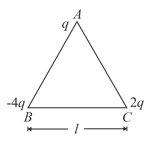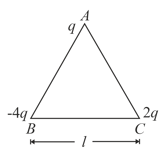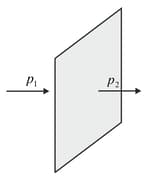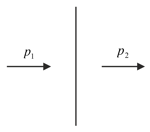S L Arora Solutions for Chapter: Electrostatic Potential and Capacitance, Exercise 4: HOTS Problems on Higher Order Thinking Skills
S L Arora Physics Solutions for Exercise - S L Arora Solutions for Chapter: Electrostatic Potential and Capacitance, Exercise 4: HOTS Problems on Higher Order Thinking Skills
Attempt the practice questions on Chapter 2: Electrostatic Potential and Capacitance, Exercise 4: HOTS Problems on Higher Order Thinking Skills with hints and solutions to strengthen your understanding. New Simplified Physics (Vol 1) For Class 12 solutions are prepared by Experienced Embibe Experts.
Questions from S L Arora Solutions for Chapter: Electrostatic Potential and Capacitance, Exercise 4: HOTS Problems on Higher Order Thinking Skills with Hints & Solutions
Three point charges and are placed at the vertices of an equilateral triangle of of side as shown in the figure. Obtain the expression for the magnitude of the resultant electric force acting on the charge .

Find out the amount of the work done to separate the charges at infinite distance.

Two point charges and are located at points and respectively. Find the electrostatic potential at and .
Two point charges and are located at points and respectively. How much work is done in moving a small test charge from the point to along the -axis?
Two point charges and are located at points and respectively. How would your answer change if the path of the test charge between the same points is not along the -axis but along any other random path?
Two point charges and are located at points and respectively. If the above point charges are now placed in the same positions in a uniform external electric field , what would be the potential energy of the charge system in its orientation of unstable equilibrium? Justify your answer in each case.
An electric dipole is kept first to the left and then to the right of a negatively charged infinite plane sheet having a uniform surface charge density. The arrows and show the directions of its electric dipole moment in the two cases.

Identiy for each case, whether the dipole is in stable or unstable equilibrium. Justify each answer.
Next, the dipole is kept in a similar way (as shown), near an infinitely long straight wire having uniform negative linear charge density. Will the dipole be in equilibrium at these two positions? Justify your answer.

